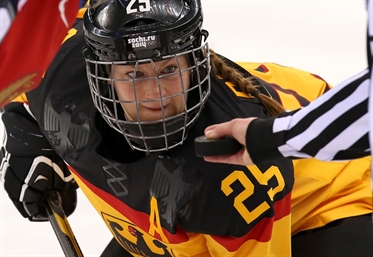Fight for survival
Fight for survival
Defeat for Germany could threaten the team's future

 Germany's Franziska Busch hopes for continued support from the German army program. Photo: Andre Ringuette / HHOF-IIHF Images
Germany's Franziska Busch hopes for continued support from the German army program. Photo: Andre Ringuette / HHOF-IIHF Images
The classification round of the women’s hockey event in Sochi may not be the most headline-grabbing event of the Games – but several players with the German team know that their livelihoods are on the line when they return to the ice on Sunday.
The German Ministry of Defence has threatened to cut its funding for the Army’s women’s hockey program if the team does not secure at least a 6th-place finish at the Olympics. And after failing to make the quarter-finals, Germany must now beat the loser of the play-off between Finland and Sweden to reach the 5/6th game.
Either opponent would be a tough ask: Sweden won the teams’ Group B clash by a comfortable 4-0 margin, while Finland is widely regarded as the strongest of Europe’s teams at the moment.
But running up the white flag isn’t an option for up to 12 members of the roster who receive financial support from the military. Failing to make the cut may well spell unemployment.
“If we lose the funding I don’t have a job any more,” says Germany’s leading scorer in this tournament, Franziska Busch. “Right now I’m in the army’s sports program, but if I lose that I’d have to find a regular job somewhere else.”
Busch, 28, trained with Volkwagen and would expect to find office work of some kind. But that would spell the end of the current arrangement with the military which enables her to devote 70% of her time to hockey, while spending the other 30% of her working hours in uniform.
While it’s an anxious situation, there are still grounds for optimism. So far Germany’s results in Sochi have mirrored the team’s progress at its last Olympics in Turin. Both competitions began with two defeats before the final group game saw success – a 4-0 win over Japan this time, and a 2-1 victory against Switzerland eight years ago.
The Swiss win was the springboard for a 5-2 humbling of host nation Italy and a gritty shoot-out win over Russia – following a 0-0 tie – to snatch fifth place. A repeat would match expectations and extend the current arrangements with the Ministry of Defence.
For Busch, who was part of that 2006 Olympic roster, the experience is a useful buffer against the rising pressure – she knows what Germany can achieve at Olympic level. But while the top nations feel the pressure of medal expectations, she and her team-mates could be playing for the survival of their sport.
“It puts a lot of extra pressure on us if we lose that funding,” she admitted. “We don’t have so many players in Germany and we need all the help we can get. The army money is a big help and this generates more pressure, especially on the younger players.”
Among those younger members of the squad, Manuela Anwander, 22, is facing the prospect of this being her first and last Olympics. She also scored in the win over Japan but could see big changes in her life if the classification round goes against the team.
“I wouldn’t have much time to train,” she admitted. “And I’d probably have to take up babysitting or something to earn some money.”
Back to Overview







































